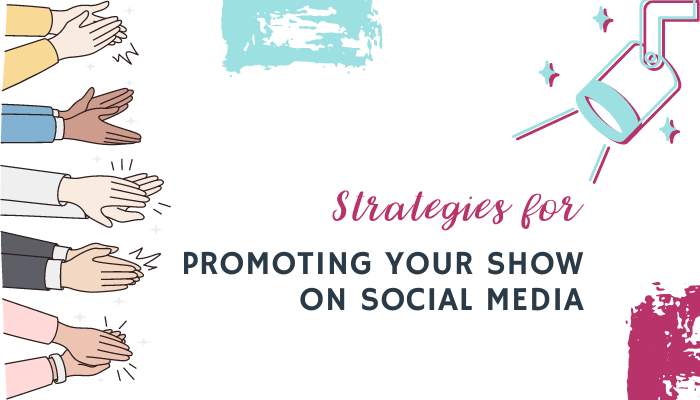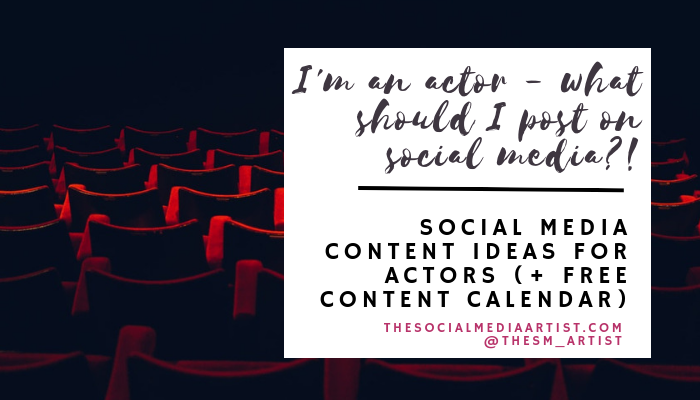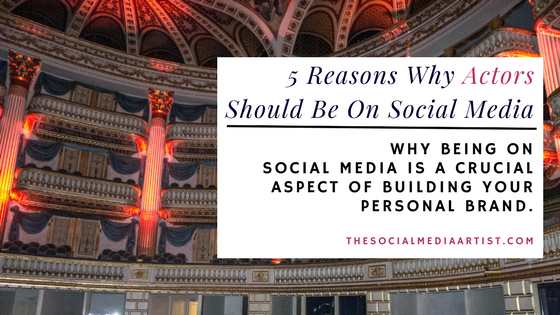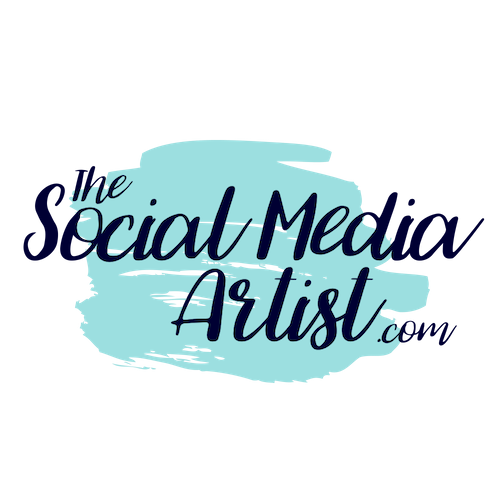
Acting, Artist Marketing, Music Marketing
Introduction
Social media can be a powerful tool for building buzz around your show. It’s also a great way to reach people who wouldn’t otherwise know about you. But if you don’t have time to manage your social media strategy, it may not be worth the effort. The key to making social media work for you is to set up your own personal automation system so that when something happens, you get an alert and can take action right away!
The number one rule of thumb when promoting your show is to start early.
The number one rule of thumb when promoting your show is to start early. If you start early, it gives you time to test out different strategies and experiment with what works for you. This will also give you time to build up some excitement for your show before it airs. You’ll want to be able to tell people about the release date and make sure that they know where they can find it!
You should also try getting involved in social media communities related both specifically and tangentially related areas. For example, if I were writing a sitcom about two friends named Claire and Danny who run a coffee shop together, I would join groups on Facebook like “Coffee Shop Owners” or “Coffee Lovers.” These groups may not be as huge as something like Comic Books as a whole but they can still reach people who are likely interested in my show!
Write a great pitch for your show.
When promoting your show, you’ll often find yourself with the task of writing a short, catchy headline. This is the most important part of your pitch and should be concise, informative and engaging in order to get people’s attention.
- Include the show title and dates (ex: “The Great Gatsby at Theater XYZ”)
- Include the venue (ex: “Theater XYZ”)
- Include ticket prices (ex: $15–20)
- Include time/location information (ex: 7pm–8pm Saturday Jan 14th at Theater XYZ)
Start by making a poster that includes all the information people need to know about your show.
Start by making a poster that includes all the information people need to know about your show, including:
- The date, time, and location of your event.
- A catchy title for your event.
- An image that visually shows what you’re promoting (for example, if it’s an art show, include a photo of an artwork).
The idea is to grab people’s attention with something visually appealing so they’ll want to learn more about what you’re doing. The more professional and clear your poster looks, the more likely people will want to come see it in person!
Start a Facebook event and invite all of your friends.
Facebook events are a great way to promote your show. You can use the event page to promote ticket sales, or you can create an event for free shows so that people who aren’t familiar with your work know about them.
You’ll want to include a link on your event page that takes users directly to the ticketing site or your website, so they know where they need to go in order to buy tickets.
Share your social media posts as often as possible, but don’t annoy people.
You don’t want to annoy your audience with too many posts, but it’s also important to show that you’re actively working on your content. If you post very infrequently, viewers will assume you aren’t doing anything and will lose interest in your account. To maintain a healthy balance of posting frequency, try posting five times a week at most. In between those posts, share other relevant information that isn’t related specifically to the show (behind-the-scenes photos; personal stories).
If people are tired of seeing only one kind of thing from you, they might unsubscribe from your channel or stop following along on social media altogether. There are plenty of different types of content—try mixing things up so that each social media platform has its own unique feel (for example: use more photos on Instagram than Facebook).
Consider creating a hashtag for your show.
Now that you’ve got a show, it’s time to promote it on social media. While you might be tempted to jump right into creating a Facebook page, Twitter, TikTok and Instagram feed for your show, remember that creating a hashtag can help people find your work more easily.
To create one, ask yourself this question: what are people going to say about my show? If the answer is “it’s too long,” then you should probably rethink your idea. But if the answer is “this is hilarious” or “I love all the characters” or whatever else comes up during your brainstorming session, try turning this into a hashtag using these steps:
- Make sure it’s not already in use by another company or person. This may seem obvious but just wait until someone else has used “#FunTimesWithCandiceAndKirby” before you get started on yours!
- Keep it simple—you don’t want people having difficulty remembering how they found out about the show in the first place!
Post reviews of your show on Instagram or other social media sites.
As a playwright, you have likely seen the importance of reviews. Reviews are an opportunity to share your show with people who haven’t seen it yet, as well as a way to thank fans who have supported you by seeing the performance.
If you’re running a show that has been produced before and is being revived in another city or region, consider posting reviews from previous productions on Instagram and other social media sites. You can also gather friends or family members who have seen the production previously and ask them for their thoughts about it so that you can post their feedback online as well.
Create link-backs from outside resources to drive traffic to the url you want people to visit (the event page or ticket sales page).
Here’s how it works:
- Create link-backs from outside resources to drive traffic to the url you want people to visit (the event page or ticket sales page).
- For example, if your show is about dogs and you have a blog on dog training, create an article on your site titled “Tips for choosing a good dog trainer” that links back to your show.
- Or if one of your sponsors is a pet supply store in town, they might want to create a coupon code just for people coming from their website. They will then post the code on their site and promote it on social media.
- Link-backs work best when they are written by someone who has expertise in the same subjects as your content but aren’t directly involved with promoting it online themselves.
Build buzz with contests.
Contests are a great way to build buzz, and they’re especially effective if your prize is something related to your show. For example, if you’re promoting an improv comedy show, give away tickets or free passes. You can also set up a social media contest with the prize being tickets—just make sure it’s easy for people to enter by tagging the post in their own post and including the hashtag #ContestEntry. Don’t make it too complicated or time-consuming; just ask them to tag themselves once on Twitter or Instagram. This will help you grow your following because users will be exposed to the content of others who’ve already entered (and possibly shared) this same contest!
A successful social media marketing strategy can be simple and not time-consuming if you make it easy for yourself by getting ahead of it and automating some processes!
In order to be successful, you need to be consistent and get ahead of your social media marketing. You can do this by using tools like Buffer or Hootsuite that allow you to schedule posts in advance, so that all you have to do is post and forget about it! Also, if you’re not sure what kind of content people want from your show, just ask for feedback. If people are responding well to one type of post over another then keep doing more like those!
If there’s a trend in the industry or news that could benefit your show’s audience, make sure they know about it and add it into their feed somehow! Don’t just stick with what works though—you need to stay on top of new trends so that when they come out next time around they’ll still be relevant enough for people who weren’t paying attention before (because who has time?).
Conclusion
As you can see, promoting your show is not complicated or time-consuming. The most important things are to start early and be consistent with your efforts. If you do those two things, then your social media strategy will work for you!

Acting, Facebook, Instagram, Social Media |
There’s no doubt that mastering social media as an actor can be difficult. You want to post content that is interesting, useful and helps build you a loyal audience but there are so many different social media platforms that it can sometimes get overwhelming trying to keep on top of them all. So how do you figure out what to post? And how can what you post help to further and promote your career as an actor?
We’re going to break it down into an easy step-by-step guide so you can worry less about what you’re posting and focus more on what you love – acting!
Step 1 – Choose a content category
When trying to create a cohesive and interesting social media presence as an actor, it can be hard to know exactly what to post. In our experience, the type of content that is perfect for you to post can be broken down into 5 categories, regardless of where you’re posting it.
1 – Projects I’m working on
Any media that shows you rehearsing, auditioning, working or in the middle of a project. These kinds of posts help promote you as an actor – they show people that you’re busy, you’re working, and what’s more, you’re in demand! Being busy with work proves the quality of your acting, and will also prove your passion for your craft.
2 – Projects / people I love
It’s important to talk about yourself and what you’re doing, but it’s just as important to build a backstory and add some personality to your profile. Whether you are looking to use social media to increase your profile, help you network, or help you get jobs (or a combination of all of these), social networks are designed for sharing not only what you’re doing, but who you are. Sharing what inspires you, or what continues to motivate you helps your audience to understand you better.
3 – About me (as an actor)
There’s thousands, even millions, of actors in this world, with many of them vying for the same roles and same opportunities. When it comes to *really* standing out, you have to show what makes you unique – what you can bring to a role that nobody else can. Maybe you have a unique story to tell, maybe you are inspired by someone really eccentric, or maybe you have a real-life experience that makes you the person who can really stand out in a particular role… whatever it is that makes you YOU is worth highlighting!
4 – About me (as a person)
Just like showing off who you are as an actor, you also need to show who you are behind your job too!
Personality is what sets you apart from the rest. What you have to offer is special and unique – there is no other you in this world! So why not highlight what makes you uniquely you, and use it to your advantage? At the same time, personality is what draws people to you, creating relationships, friendships and professional contacts. Don’t be afraid to show who you are!
5 – Fun posts!
You want to show you’re serious, motivated, professional and passionate… but balance is the key to life and sometimes you have to cut loose!
Showing how you like to have fun, telling jokes, sharing memes (especially those related to your art), and general silliness is advised! The acting world is full of fun characters and eccentric personalities so don’t be afraid to show yours – you’re in the business of entertainment, after all! 😜

Step 2 – Choose your media
1 – Photo
Photos can be the easiest type of content to post – it’s quick, it’s easy, and you can get pretty amazing quality even on a smartphone.
Great for: selfies, action shots, behind-the-scenes, headshots, silly posts, etc.
2 – Video/ Gifs
More and more people these days like watching videos, with an amazing one-third of all online activity consisting of watching video! Whether it’s a short video, a Boomerang or a gif, your audience will always enjoy you posting some video content!
Great for: showing auditions, acting, monologues, previews of shows or film, behind-the-scenes, showing your personality, etc.
3 – Link (to websites, blog posts etc)
If you have a blog or a website, or if you find something that’s so interesting that you feel you want to share it – go ahead! Links are especially good on Facebook, where people can easily click through to the website.
Great for: sharing your thoughts, sharing news about your industry, sharing links to other social media or your website, linking to projects you’re working on or involved in, promoting tickets to shows, etc.
Step 3 – Choose your hashtags
Hashtags are important when it comes to social media (especially Instagram and Twitter); in fact, posts with at least one hashtag have 12.6% more engagement than those without. Imagine how much more engagement you could get with more hashtags, all targeted specifically to your audience? The answer is – a lot more! And this could be the key to building an audience that really enjoys following you on social media!
Need help making your Instagram captions POP? CLICK to read how to write engaging Instagram captions
You can use online websites to help you find the most popular hashtags (particularly suited for your audience) at places like All-Hashtag.com and Hashtagify.me, but you can also find which hashtags are popular in your niche by analysing what other people in your niche are using. Be careful not to use too many or you can seem spammy and desperate for likes, which will turn people off. Sometimes less is more, but ultimately it’s up to you to decide which ones are effective and suit you.

Step 4 – Publish your post & respond to your audience!
You’ve followed the steps in this post and you’ve posted some GREAT content…. but your work’s not over!
Make sure you respond to all your comments and acknowledge everyone who engages with your content. It’s the sure way to build a relationship with your audience and get people coming back for more!
Still need content ideas? Download the free 31 Days of Instagram Content (For Actors) Calendar!

Acting, Artist Marketing, Branding, Social Media
To be or not to be on social media, that is the question. We’re here to say that the answer is definitely to be. Social media is an undeniably powerful networking tool and an absolutely essential aspect of creating your personal brand as an actor. But if that isn’t enough to convince you, here are 5 reasons why actors should be on social media:
Make New Connections
The most obvious and most important aspect of social media is engaging with other people and making connections. Reaching out to potential followers and like-minded individuals through liking, commenting and even creating a 1 on 1 dialogue is a great way to build a network. You can meet new fans, fellow actors who you admire, as well as casting directors and agents who can get you in the audition room. Making connections has never been easier than it is now; using relevant hashtags and posting on Facebook, Snapchat, Instagram or Twitter can bring you new, relevant followers fast. Social media is a party and the only way to meet new people is through interaction, so don’t be shy!
[Tweet “Social media is a party and the only way to meet new people is through interaction, so don’t be shy!”]
It’s Your Online Resume
Using IMDb Pro can give you the chance to showcase the work you’ve done as an actor, including the roles you’ve earned, training you’ve gone through and education you have under your belt that qualifies you to be the amazing actor that you are! Using sites like YouTube or Facebook are also great for uploading direct photo and video content to demonstrate your talent and personality, showing people what it is that sets you apart from everyone else out there. Also, having an online resume/portfolio showing off your experience gives those with work opportunities a much higher chance of finding you and all that talent of yours!
Connect with Your Fans
Having a relationship with your fans and showing them some love and appreciation is a great way to keep them around, and possibly even bring some new fans in along the way. Reply to comments, share interesting content if it’s relevant to you, give fans a follow back, and advertise upcoming performances. Let people easily know when, where and what you’ll be performing, and how they can come to see you. Don’t be afraid to thank people for coming out; if you noticed specific individuals in attendance, reach out and show your gratitude. Be there for your fans and they’ll be there for you!
Find Work
Finding work with social media is much easier than finding it without. Making connections with the right people and having an online resume can boost your chances of finding work opportunities significantly, and many people looking for talent will post notices on social media sites quite frequently. Social media also presents entirely new opportunities for work in itself. YouTube web series, vlogs, sketches and more are all popular potential options where many now-famous actors got their start in the entertainment industry. It also gives you the freedom to make your own decisions and express your own creativity in a medium that has proven to be quite popular in online communities.
Find Communities
These are a great way to find alike people with similar interests. They could be a community of theatre actors, a community of film students looking for talent for their next short film, or even a community of fans who just appreciate acting and enjoy talking about what’s trending in the world of entertainment. The point is, these are groups of individuals who already like what you like and are talking to each other about it. If you insert yourself into these discussions, you can dramatically increase your chances of finding new followers, work opportunities, exciting offers and more!
Social media is only growing bigger and more prevalent in our world, and it is definitely here to stay. Having an online presence opens up more doors for possibility, provides a better outlet for building a name for yourself, and is essential for self-promotion…so what are you waiting for?





